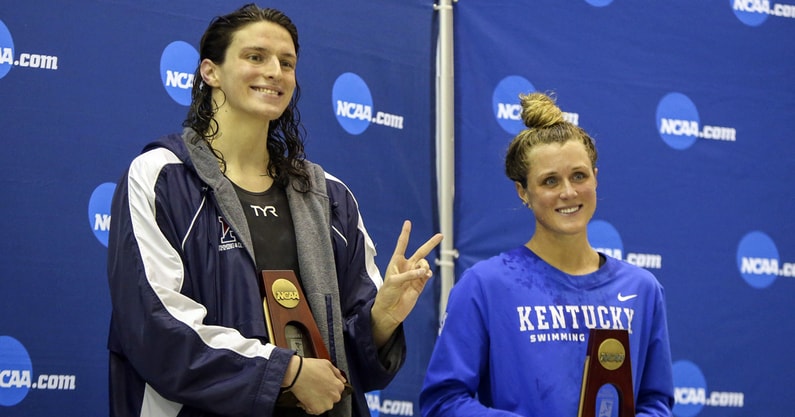Sixteen female athletes file Title IX lawsuit over NCAA transgender policies

Sixteen former and current collegiate female athletes filed a lawsuit Thursday against the NCAA, the University System of Georgia and other institutions in the Northern District of Georgia.
The group of athletes is specifically challenging the NCAA’s regulations allowing male athletes to compete in women’s sports. The lawsuit seeks to change the NCAA policies that allow male athletes who identify as transgender to participate in women’s sports, according to a release.
The argument states that current NCAA regulations compromise the fairness and integrity of women’s competitive sports and discriminate against women, therefore violating Title IX principles.
Among the plaintiffs in the case are Riley Gaines, Reka Gyorgy, Kylee Alons, Kaitlyn Wheeler, Ainsley Erzen Ellie Eades, Lily Mullens, Susanna Price, Carter Satterfield, Kate Pearson, Katie Blankinship, Julianna Morrow and four other athletes who have joined the lawsuit under pseudonyms for protection from retaliation.
The Independent Council on Women’s Sports (ICONS) also announced exclusive funding to support the lawsuit.
“We’re not just fighting for ourselves, we’re fighting for every young girl who dreams of competing in sports,” Gaines said in a statement. “I’m thankful for ICONS’ commitment to our cause, especially their financial commitment allowing us to take this to court. I urge anyone who cares about protecting women’s sport to help get behind us.”
The complaint requests an injunction against the NCAA and the universities hosting championships in 2025 and 2026 from implementing the governing body’s transgender policies. The SEC Swimming and Diving Championships are scheduled for Feb. 18 to 22, 2025 at the University of Georgia. The 2025 NCAA Division I Women’s Swimming and Division Championships are set to be held at Georgia Tech.
North Georgia will host the 2026 NCAA D-I, II and III Women’s Rowing Championships. Plus, the NCAA Division I Women’s Tennis Championships are scheduled to be held at the University of Georgia in 2026.
“This lawsuit against the NCAA isn’t just about competition; it’s a fight for the very essence of women’s sports,” ICONS co-founder Marshi Smith said. “We’re standing up for justice and the rights of female athletes to compete on a level playing field. It’s about preserving the legacy of Title IX and ensuring that the future of women’s sports is as bright as its past.”
What is NCAA’s stance on transgender rights?
NCAA President Charlie Baker was asked about the debate surrounding transgender athletes’ participation in women’s sports during a Congressional NIL hearing in October.
Baker, who replaced former NCAA President Mark Emmert in March 2023, said during the hearing with the Senate Judiciary Committee that he would not defend what happened before he took over.
Top 10
- 1Breaking
Mack Brown
UNC coach plans to return in 2025
- 2New
Portnoy bets on Bama
$100k wager to win $1.1M on Alabama
- 3
Cignetti responds
Hoosiers HC fires back at SEC
- 4
Jim McElwain
Central Michigan, former Florida head coach to retire at end of 2024 season
- 5Trending
Ray Lewis
FAU sources respond to Ray Lewis report from ESPN
“I’m not going to defend what happened in 2022,” Baker said in response to questions about the NCAA’s current policy with regard to transgender athletes.
“I wasn’t there. I was still governor of the Commonwealth. What I will say is, we have very specific rules and standards around the safety and security of all our student-athletes, and anyone who hosts one of our national championships has to accept that they know what they are and then abide by them accordingly. I don’t believe that policy would be the policy we would use today.”
Baker was also asked by the Associated Press after taking over the job if he believe the NCAA should take social or political stances when it comes to transgender rights and state laws.
“I think our championships need to reflect the fact that we’re in all 50 states, but the people who actually host those championships need to make sure that every kid who participates in them gets the kind of positive experience out of it that they should get,” Baker told the AP last March. “And I think that for me is sort of the most fundamental issue there.
“But I think it’s important for us to represent the membership, which is very broad, very diverse. They have a lot of different opinions about a lot of things. I’ve ended up in conversations with people who are part of a lot of these organizations who don’t agree with me on everything in that environment. And I get that, but they damn well better make sure that if they host anything that involves student-athletes, those student-athletes feel like they’re properly supported.”
NCAA legal pressures continue to mount
The lawsuit filed by Gaines and multiple female athletes is just the latest legal threat against the NCAA. The NCAA and Power Five conferences could owe thousands of athletes some $4.2 billion in retroactive NIL pay and broadcast revenue because of the House v. NCAA lawsuit.
In the Johnson v. NCAA lawsuit, the plaintiffs are asking athletes to be deemed employees subject to the Fair Labor Standards Act. Another NLRB trial alleging USC, the Pac-12 Conference and the NCAA as joint employers of USC’s football and men’s and women’s basketball players is playing out in Los Angeles.
Recent preliminary injunctions have made the NCAA powerless over NIL and the transfer portal.